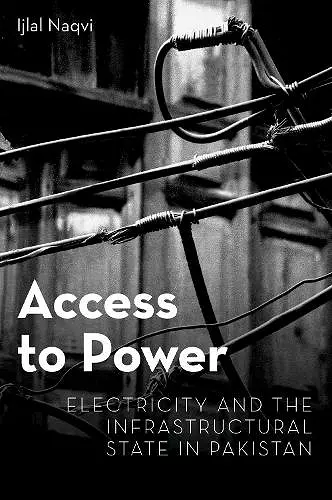Access to Power
Electricity and the Infrastructural State in Pakistan
Format:Hardback
Publisher:Oxford University Press Inc
Published:16th Dec '22
Should be back in stock very soon

This is an open access title available under the terms of a CC BY-NC-ND 4.0 International license. It is free to read at Oxford Scholarship Online and offered as a free PDF download from OUP and selected open access locations. Pakistan would desperately like to produce enough electricity, but it usually doesn't. Despite prioritization by successive governments, targeted reforms shaped by international development actors, and featuring prominently in Chinese Belt and Road investments, the Pakistani power sector continues to stifle economic and social life across the country. Why? In Access to Power, Ijlal Naqvi explores state capacity in Pakistan by following the material infrastructure of electricity across the provinces and down into cities and homes. Naqvi argues that the national-level challenges of crippling budgetary constraints and power shortages directly result from conscious strategic decisions that are integral to Pakistan's infrastructural state. As he shows, electricity governance in Pakistan reinforces unequal relations of power between provinces and the federal center, contributes to the marginalization of subordinate groups in the city, and cements the patronage-based relationships between Pakistani citizens and the state that have been so detrimental to development progress. Looking through the lens of the electrical power sector, Access to Power reveals how Pakistan actually works, and to whose benefit.
Access to Power is a conceptually sophisticated analysis of how different kinds of consumers at the national, city and individual levels negotiate with Pakistan's long-faltering energy sector. Based on a wide range of interviews, it offers rare insights into the changing interstices of state and society in Pakistan." -Ayesha Jalal, Mary Richardson Professor of History and Director, Center for South Asian and Indian Ocean Studies, Tufts University
Building on the emerging field of critical infrastructure studies, but embedding these concerns within longstanding discussions of state formation, this fascinating book shows us why the Pakistani state's presence is unevenly distributed within and across urban and national territory. Among Naqvi's most provocative findings is his claim that state failures to stem predation in the electricity sector are directly influenced by social formations that provide their own networks of production and consumption, both licit and illicit, thus relegating the formal administrative institutions of the state to a secondary role, particularly at the scale of the city. Electricity demands emanating from cities are central to the scalar dynamics of national governance even as they undermine state capacity locally." -Diane E. Davis, Charles Dyer Norton Professor of Regional Planning and Urbanism, Graduate School of Design, Harvard University
An interesting discussion of an important topic. Naqvi takes access to electricity as a lens on state-building in Pakistan. His extensive research, including years of fieldwork, takes us inside Pakistani state bureaucracies and cautions against equating formal rights with substantive access." -Monica Prasad, Professor of Sociology, Northwestern University
Access to Power unpacks the riddle of why so many efforts to reform the electricity sector in Pakistan have failed and why electricity remains such an unequally distributed service. Moving beyond the good governance literature, Naqvi locates power and politics at the center of his inquiry and through a nested analysis that moves from the national to the local methodically exposes the distributional conflicts and strategic actions that shape uneven state capacity. If many have called for disaggregating the state, Naqvi actually delivers. This is sociology at its best and a must read for anyone interested in understanding development as a contested process." -Patrick Heller, Professor of Sociology and International Affairs, Brown University
Access to Power by Ijlal Naqvi is a fascinating book, focusing primarily on the tremendous electricity shortage in Pakistan as a glaring example of a deficient governmental structure, a situation common in South Asian states. * Priyanka Guha Roy, Project Muse *
ISBN: 9780197540954
Dimensions: 163mm x 239mm x 20mm
Weight: 458g
208 pages